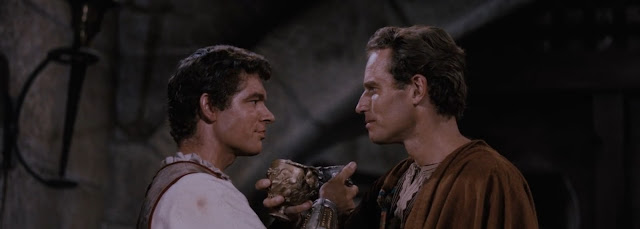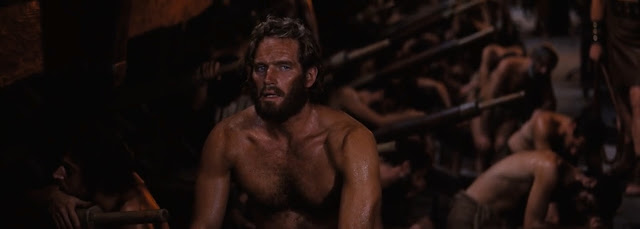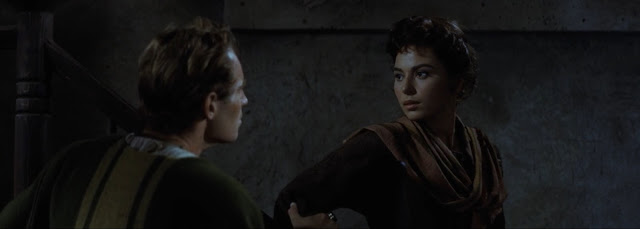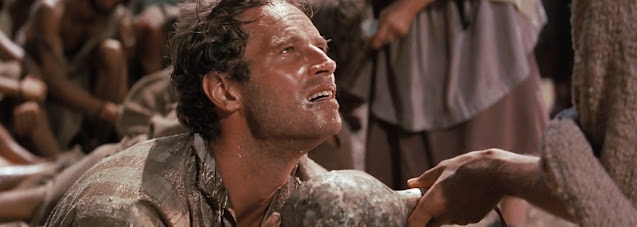 |
| Messala (Stephen Boyd) and Judah Ben-Hur (Charlton Heston) in one of their last friendly moments. |
Release Date: Nov. 18, 1959. Running Time: 222 minutes. Screenplay: Karl Tunberg, Maxwell Anderson (uncredited), S. N. Behrman (uncredited), Gore Vidal (uncredited), Christopher Fry (uncredited). Based on the novel, Ben-Hur: A Tale of the Christ, by Lew Wallace. Producer: Sam Zimbalist. Director: William Wyler.
THE PLOT:
Judah Ben-Hur (Charlton Heston) is a prince of Judea, and he remains both wealthy and influential despite the Roman occupation of the region. Judah, his mother, and his sister are all overjoyed when his childhood friend, Messala (Stephen Boyd), returns from Rome as second in command of the province.
Their joy is short-lived. Messala is ambitious, determined to build his name by silencing the rebellious murmurs among the conquered Jews. When Judah refuses to help, Messala takes it as a personal betrayal. Not long after, an accident injures Judea's new Roman governor - giving Messala the opportunity to arrest Judah and his family. Judah's mother and sister are imprisoned, while he is sent off as a galley slave.
Three years later, Judah's fortunes shift again when he saves the life of the fleet commander, Quintus Arrius (Jack Hawkins). Arrius frees him, and Judah becomes his champion in the Roman chariot races. With the protection of Arrius's backing, he returns to Judea to search for his mother and sister and to gain revenge on Messala through an entirely legal avenue: by challenging him in the next chariot race!
 |
| Years as a galley slave strengthens Judah's thirst for vengeance. |
CHARLTON HESTON AS JUDAH BEN-HUR:
Heston had delivered one of his best performances for director William Wyler's previous film, The Big Country, and he's almost as good here. His nonverbal reactions are particularly effective, from the openness of his grin when first reunited with Messala, to the glint of hatred in his eyes when he's rowing in the galley.
Even early on, when Judah is wealthy and content, he has a temper. When Messala presses him for names of dissidents, he snaps at him for trying to make him betray his people. Instead of trying to diplomatically deflect Messala, he marks himself as an enemy by proclaiming: "The day Rome falls there will be a shout of freedom such as the world has never heard before!" Never mind the later accident; had he been just an ordinary citizen, it's a near certainty that Messala would have arrested him just for speaking those words.
Heston is excellent whenever he's portraying strong emotions. All of that said, I don't think his performance is as strong as in either The Big Country or 1968's The Planet of the Apes (my single favorite Heston performance). As good as he is in the angry scenes, he's much less successful when called upon to be contemplative. Instead of seeming thoughtful in quiet moments, he mostly comes across as wooden.
 |
| Judah's fortunes change when he saves the life of Roman consul Qunitus Arrius (Jack Hawkins). |
OTHER CHARACTERS:
Messala: He's ecstatic at reuniting with Judah, clearly wanting to pick up their friendship where they left off. But he's also drunk deeply of the Roman Kool-Aid. When Judah observes that he speaks of the Emperor as a God, Messala doesn't hesitate in responding: "He is God. The only God. He is power, real power on Earth!" Thus, when Judah has his outburst, denouncing Rome as evil, Messala sees that as every bit the betrayal he inflicts on his old friend. Yes, he uses Judah as an example to strengthen his position - but I suspect he'd have been less cruel had Judah not first torn so vehemently into one of the core tenets of his identity.
Quintus Arrius: Second-billed Jack Hawkins makes the most of his very limited screen time as Judah's Roman benefactor. Taking command of the fleet, Arrius notices Judah immediately, mainly for the unbroken defiance in his eyes. Arrius commends him on it: "You have the spirit to fight back, but the good sense to control it." A lifelong military man, he lost his son years earlier, presumably in one of Rome's many military campaigns. He comes to see Judah as a surrogate son, championing his innocence to the emperor and even legally adopting him - granting Judah the power of his name to protect him from Messala when he returns to Judea.
Esther: When we first meet her, she's about to be married, but it's apparent that she's as smitten with Judah as he is with her. Since we never see her intended husband and she specifically states that she's barely met him, there's no viewer discomfort in their early interactions. Outside of being Judah's Designated Love Interest, she also acts as his conscience. All of this is pretty stock stuff, but it must be said that Israeli actress Haya Harareet is captivating on film, her eyes wide and expressive as she implores Heston's vengeful Judah not to resort to violence.
 |
| Esther (Haya Harareet), Judah's love interest and conscience. |
THOUGHTS:
Given the proliferation of Biblical epics in the 1950s and '60s, it's somewhat surprising that Ben-Hur is the only such film to win Best Picture. Still, if only one was going to win, at least they picked right. This movie is glorious entertainment, offering up spectacular set pieces in service to a gripping story.
Question: When classic filmmakers are discussed, whey is William Wyler so often overlooked? His movies, even the largest scale ones, were centered around characters, but he blended that character focus with moments of pure cinema: Dana Andrews' haunted war veteran in The Best Years of Our Lives, walking through a graveyard of fighter planes that are no longer of any use, mirroring his own feelings about himself; the fistfight between Gregory Peck and Charlton Heston in The Big Country, shown in longshot to emphasize both the smallness of these men against the land itself and how ultimately meaningless their conflict is; and the set pieces in Ben-Hur, which always return to the characters and who they are.
There are several moments that stand out. Messala, sharing a meal with Judah's family, presents his sister with a gift: a brooch he took from a campaign in Libya. He casually talks about Libya's capital, completely conversational as he describes destroying the city - an early indication of his ruthlessness, and also a warning to Judah. After Judah is sentenced, Quintus Arrius is introduced testing the slaves with a full drill. As he keeps demanding increased speed, some men fall out of rhythm and are beaten. More speed, and a couple of slaves collapse. Arrius sits impassively throughout, his attention firmly on Judah, who keeps every new pace that's set. He's too focused to meet Arrius's gaze - but every time he looks up, his face is set in defiance.
Then there is the greatest of the movie's set pieces...
 |
| The chariot race: An iconic Hollywood action scene. |
THE CHARIOT RACE:
This is still considered to be one of Hollywood's greatest action scenes and with good reason. It's masterfully shot and structured. The setting is established first, as the contestants parade around the loop before the race begins. Few of the shots of the race are from above, and all such shots are during the first, least instense portion. We're mostly kept close to the racers, the camera right behind Judah as he gains on the other contestants while going around the curve, or directly in front of Judah or Messala during the contest.
Just before the most suspenseful portion of the scene, we see Messala knock another racer out of his chariot. The man makes a well-timed jump to evade the horses coming at him - only to almost instantly be trampled by another chariot. It's a brutal moment that makes real the danger we've previously merely been told, and it comes just before the focus narrows to only Judah and Messala, who are now shown on screen together as their battle reaches its endpoint.
The sequence is breathtaking, superb filmmaking even just on a visceral level - but it's also notable for how it returns constantly to the two characters, with the final struggle effectively a stand-in for their entire conflict, their former friendship having devolved into a mutual, raw hatred.
 |
| Judah receives a very important cup of water. |
BEN-HUR AS A RELIGIOUS MOVIE:
Remember when religious movies were made for all audiences to enjoy, rather than deliberately excluding secular viewers? Ben-Hur is a religious movie, based on a book subtitled, "A Tale of the Christ." For most of its running time, the religious elements are a backdrop to the drama of Judah's search for his family and for vengeance, but that element still remains a constant presence.
The prologue doesn't feature or even mention the Ben-Hur family. Instead, we open on the birth of Christ. The filmmakers keep this short, portraying just a couple of key moments through familiar, even pageant-like visuals. The wise men watch and follow the Star of Bethlehem, then present themselves to the infant, with the latter moment staged very like a traditional Nativity scene. Only then does the film cut to the opening titles and begin Judah's story. The result is that, from the outset, Judah's journey is folded into and linked to the larger Christ tale.
The entire narrative is dotted with references. Drusus, the old garrison commander Messala relieves, talks about how the Judeans are "drunk with religion." He mentions John the Baptist, speaking of him with the dismissiveness reserved for crazy cult leaders. Then he mentions "a carpenter's son," noting that he finds some of what this man says "quite profound."
When Judah returns to Judea, he encounters Balthasar (Finlay Currie), one of the wise men from the prologue. Later still, Judah, filled with despair and a thirst for vengeance, passes by The Mount of Beatitudes just before the Sermon on the Mount. Though Esther urges him to stop and listen, he leaves her behind, proceeding instead to a bitter meeting with Pontius Pilate.
Then there are the moments in which Christ makes direct appearances. These are handled artfully. Opera singer Claude Heater was cast in the role, but his face is never shown. Judah encounters him during the long march to the galleys, when Christ gives the parched man water. We mainly just see his hand, holding the cup to Judah, and Judah's reaction (as elsewhere in the film, Heston's nonverbal performance is superb). He appears once more in the epilogue, centered around his trial and execution. Again, he is shown from the back, with the focus on Judah's reactions when he recognizes him.
The way the religious tale is woven in and out of Judah's story lends the main narrative a broader context, while also making the religious story more immediately relatable. The religious references and scenes are an important part of the movie's fabric, but they are never allowed to get in the way of the main plot. Each thread ends up strengthening the other.
 |
| Judah stands at the periphery of The Sermon on the Mount. |
AN EXTENDED EPILOGUE:
For more than three hours, Ben-Hur sustains its running time remarkably well. The Judah/Messala conflict is spellbinding, and the spell holds even after their battle is resolved. At the 190-minute mark, after the chariot race, Judah meets with Pontius Pilate. Judah's defeat of Messala has not satisfied his thirst for revenge, and follow-up scenes have left him filled with despair. Their confrontation is soft-spoken, with no raised voices, but it bristles with tension.
Critically, Pilate is no Straw Roman. He speaks with intelligence. He urges Judah not to fall prey to his resentment. He acknowledges the injustices done to him, stating: "Where there is greatness - great government or power, even great feeling or compassion - error also is great. We progress and mature by fault." He extends an offer of friendship, even in the face of bitterness, and he allows Judah to leave in peace. Even as he does so, however, he issues a stern warning: "I cross this floor in spoken friendship... but when I go up those stairs, I become the hand of Caesar, ready to crush those who challenge his authority."
The spell finally breaks not long after, however, with the final thirty minutes proving to be a little too much epilogue. The structure here is fine, with Judah saved from his own rage by one last intersection with the Christ story. But just about every scene is suddenly allowed to overrun, and the pace becomes sluggish for the first time the entire movie. I think the movie would have been better served had about ten minutes been shaved off - not really with any scenes removed, but with some general tightening.
It's not enough to cost the movie full marks. But it does represent a flaw in an otherwise wonderfully engrossing, beautifully made motion picture.
 |
| Judah is victorious, but still unsatisfied. |
REMAKES AND RETELLINGS:
The 1959 movie is easily the best remembered version of Ben-Hur, but there have been several others, dating back to the silent era:
Ben-Hur (1907): The first film version of Lew Wallace's novel, a 15-minute silent film that dramatizes some of the book's highlights. More of a film history curio than something to be watched for entertainment.
Ben-Hur: A Tale of the Christ (1925): This silent epic was a mammoth production, one beset by cost overruns and production difficulties. Had it failed at the box office, it might well have bankrupted MGM. Instead, its success cemented the studio as one of Hollywood's major players. Notably, a young William Wyler was one of the film's assistant directors.
Ben-Hur (2003): An animated version, with Charlton Heston returning to voice the title role. From the same producers as the Greatest Heroes and Legends of the Bible animated series, it's unsurprising that it's reputed to be more overtly religious than previous versions (and presumably a lot less violent).
Ben-Hur (2016): Directed by Timur Bekmambetov, the man behind such titles as Wanted and Abraham Lincoln: Vampire Hunter, this opened to negative reviews, with complaints about over-edited action scenes and distracting CGI. Audiences mostly steered clear, and the film ended up being regarded as one of 2016's biggest financial follies.
OVERALL:
My reservations about the epilogue aside, 1959's Ben-Hur is an excellent motion picture. The set pieces remain spectacular, and director William Wyler makes sure that even the grandest moments always return to the characters, which helps the story to sustain its extremely long running time.
A few trims in the final stretch wouldn't have gone amiss - but this is still one of Hollywood's true classics, and it lives up to its reputation.
Rating: 10/10.
Best Motion Picture - 1958: Gigi
Best Motion Picture - 1960: The Apartment
Review Index
To receive new review updates, follow me:
On BlueSky:
On Threads:


No comments:
Post a Comment